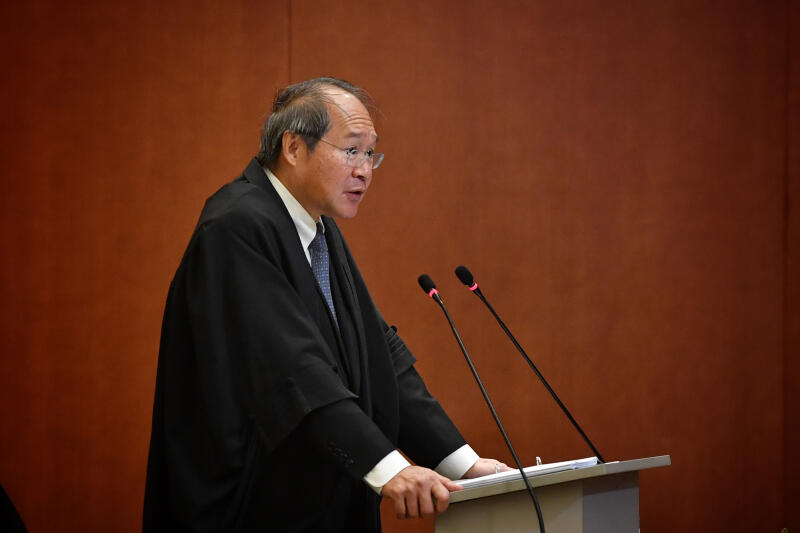Attorney-General's Chambers addressing gaps, raising accountability in prosecution procedures
Sign up now: Get ST's newsletters delivered to your inbox

Attorney-General Lucien Wong speaking at the annual ceremony to mark the opening of legal year on Jan 11, 2021.
ST PHOTO: CHONG JUN LIANG
SINGAPORE - Attorney-General Lucien Wong has spelt out steps to address institutional gaps and provide greater accountability to the public.
The training and guidance for prosecutors are being reviewed, while internal guidelines have been drawn up and briefings held to help prosecutors consider their obligations to disclose documents to the defence.
In response to the lessons from the Parti Liyani case, the prosecution is working with the police on guidelines for recording statements and obtaining valuations of items alleged to be stolen.
The Attorney-General's Chambers (AGC) will also reinforce efforts to demystify the inner workings of the prosecution, by explaining its charging decisions and educating the public on the criminal justice system through the media.
Mr Wong acknowledged that imperfections in the past year exposed his organisation to intense scrutiny and criticism.
But he pledged that it will do better in carrying out its fundamental duty to assist the court in making the correct decision.
He also made it clear that he would not allow the fear of failure or public backlash to stand in the way of AGC's duty of prosecuting worthy cases fairly.
In his speech at the annual ceremony to mark the opening of the legal year, Mr Wong talked about how, amid the battle against Covid-19, prosecutors also had to weather "our own crisis of sorts".
"What made 2020 uniquely challenging was a sense that the public's trust in us was at stake. That is something we take extremely seriously because that trust is fundamental to our mission, and we work very hard to be worthy of it," he said.
He identified the cases of Ms Parti Liyani and Gobi Avedian as among the several decisions that did not go in favour of AGC.
The case of Ms Parti, a former domestic worker who was acquitted of stealing from her employer, sparked public uproar and led to a nine-hour parliamentary debate over the criminal justice system. The two prosecutors are now facing a disciplinary inquiry.
Gobi, a Malaysian drug runner, was acquitted of a capital charge. He has filed a civil suit against Mr Wong and other prosecutors.
Mr Wong stressed that AGC's motive was not to win at all cost but to reach just outcomes fairly.
Charging decisions are made only after prosecutors are satisfied that there is sufficient evidence to support a reasonable prospect of conviction, and that it is in the public interest to prosecute.
He said his team of 245 prosecutors assesses over 40,000 investigation papers a year. That number excludes court appearances in more than 7,000 matters.
Not every acquittal, however, is a sign that prosecutors have failed in their duty, he said.
He cited the case of a nursing home worker who had molested an elderly patient. The case was difficult to prosecute as it depended largely on an eyewitness account. The man was initially convicted but was acquitted by the High Court due to "evidential difficulties".
The prosecution then referred the case to the Court of Appeal, and the conviction was reinstated.
"If we refrain from prosecuting whenever there is some risk of an acquittal, then this injustice - and many others - would never see the light of day," said Mr Wong.


